



Rhino Doors has been a leading provider of high performance engineered doors for the critical national infrastructure, defence, transport and energy industries since the mid-1990s. Today, as the company approaches its 27th year in business, we’ve decided to give you an insight into the people behind Rhino Doors who are driving its continued growth and development.
In this, the first article in the series, we talk to Stuart Lawrence, Managing Director of Rhino Doors.
I first began my career after graduating as a Mechanical Engineer in 1989, where I specialised in stress analysis and thermodynamics. Following this I found myself working in a number of project management and business development roles, whilst continuing as a practicing engineer, initially as a pressure vessel & welding engineer.
By 2000, I realised it was time for a new challenge; one that would enable me to use my engineering experience as well as my commercial skills. So, following the completion of an MBA in 2002 I moved into general management and business leadership. Since then I’ve worked in a number of Managing Director and C-Suite positions before arriving at Rhino Doors in 2016.
The recurring theme throughout most of my career positions to-date is that they have been in highly regulated industries, such as nuclear, defence, oil and gas, and infrastructure. I like to think that with my engineering background, I’ve been able to shape Rhino Doors into a company which truly understands the needs of clients and is able to flexibly deliver high-quality solutions. Despite no longer routinely practicing my engineering skills, the desire to innovate and create (a characteristic of all good engineers, I believe) has I think transferred into my business leadership activities.
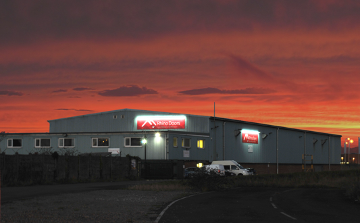
Rhino Doors can trace its roots back over 25 years, however the company has only been known as Rhino Doors since 1999 when the company undertook a re-branding exercise. The company’s roots lie in the manufacture and installation of security doors (attack delay) for UK critical national infrastructure such as Ministry of Defence, Utilities and Cash Handling facilities. During the course of those two and half decades, Rhino developed an exceptional reputation, creating market-leading attack delay solutions and capturing a significant share of the attack delay door market, because of our emphasis on innovation.
In 2015, Rhino was acquired by our current owners who sought to build upon Rhino’s strong track record, growing the business into new territories and markets.
Up until that point, Rhino was almost entirely focused on the provision of NPSA-rated (formerly CPNI) products to the UK market. Due to NPSA being a UK-centric, HM Government standard, the new owners and I very quickly recognised the importance of diversifying beyond this. I also recognised the exceptional talent and knowledge within the business, and that this could be leveraged to help Rhino support projects in new sectors such as transport, infrastructure and oil and gas, as well as the sectors we were already familiar with, but offering a broader and increased range of solutions.
Following that realisation, together with the other members of the Rhino leadership team, we developed four initiatives that would enable Rhino to achieve the ambitious growth and diversification plans we’d set out.
Firstly, we committed to ongoing investment in R&D to both support new product development and maintain our market-leading position within the NPSA market.
Secondly, we relocated to a new factory in Port Talbot, literally 300m from our original site. A factory which is modern, better equipped, and perhaps most importantly has the capacity to deliver four to five times greater output than our previous factory.
Thirdly, we have upskilled our workforce across a number of disciplines, as well as recruiting leading technical experts from within the engineered door industry. Significantly, this has allowed us to add blast protection performance to our portfolio.
Lastly, we have established a strategy to secure partnering relationships across the UK and the rest of the world. This not only broadens the range of products and solutions we can offer (including a number of exclusive licenses and patents for blast walls and explosion relief panels), but also broadens the range of geographical markets where we are represented and where you can buy a Rhino Doors product.
We no longer see ourselves as simply a supplier of doors. At Rhino we develop, design, manufacture and install portals/barriers for protection of assets from hazardous environments. Assets means people or material assets and hazardous environments now means not only the original (for Rhino) aggravated attack, but also, fire, flood, acoustic, blast and smoke/gas.
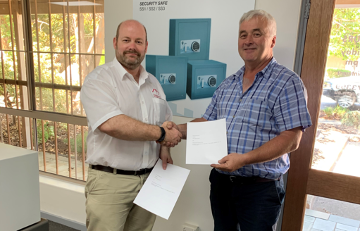
We’re already seeing the results of these initiatives.
We are now three times larger than when the company was acquired by new owners in 2015.
Rhino also employs twice as many people as it did in 2015, with the majority of these new jobs having been created at our manufacturing facility in Port Talbot, South Wales.
We’ve also succeeded in our plans to grow the export side of our business. When I joined the business in 2016, Rhino Doors had pretty much zero exports within its sales history. As of the last financial year, exports accounted for 15 per cent of our turnover.
All in all, Rhino’s been on quite a journey over the past few years, but by removing the restrictions that were inhibiting growth for the business we’ve achieved a lot in a short time, and COVID-19 notwithstanding, I fully expect to see Rhino grow further in the years ahead.
Like many companies and people perhaps, we initially didn’t expect COVID-19 to develop in the way it has, or indeed to have such a disruptive and often tragic impact on our lives.
Towards the end of March 2020, the situation developed rapidly. During the last week of March, when the lockdown restrictions were being enforced most, if not all, of our client sites where we were installing doors began to shut down. As a result of this, and the general uncertainty surrounding how to maintain operations with safe social distancing, we decided to cease all workshop and site installation activity until 1st May 2020, at the earliest.
Throughout the operational shutdown in April 2020, our design and back office teams have continued to work from home. What really amazed me through the course of April 2020 was how quickly staff working from home readily adapted to the new regime, and how efficient it has become. In fact, we have found that departments are now collaborating more than when they were sat literally a few metres away from each other in the company offices! The same is also very much true of the Rhino Executive team. At the beginning of the lockdown, and whilst working from our homes, we were not surprisingly holding meetings every day as we dealt with the myriad issues, but this practice has continued and become a natural part of our workflow and the executive are now more connected with the business and we are all better informed than we were – an indirect, but positive consequence of the lockdown perhaps? Adversity forces change and leads to innovation and improvement it seems?
Towards the end of April 2020, and having consulted with staff, we made the decision to resume operations at our Port Talbot facility. We’ve found new ways of working safely and maintaining social distancing. We were amongst the first companies to comply with the HSE’s COVID-19 Secure guidance, which has proven to be been extremely helpful. We recognise that it is impossible to eliminate all risk associated with COVID-19, however we do believe that we have mitigated it as far as reasonably possible.
It’s great to once again be fully operational, particularly as we support several industries which have needed to operate throughout the lockdown. We’ve placed an emphasis on supporting our clients within critical national infrastructure who need our products to maintain their operations.
I would say that there will be a certain unwinding of globalisation in the short to medium term as nations seek to bring manufacturing operations back within their own borders. That many countries have had to rely on imports of pandemic specific equipment (PPE etc.) has undoubtedly caused concern and woken many people up to the risks associated with transnational supply chains and outsourced manufacture of critical items.
Certainly, I think manufacturing businesses will be taking steps to mitigate any future disruption. I imagine that many businesses will be looking to source essential materials/services closer to home, avoiding the risk of future border closures and other restrictions.
In terms of the current phase of lockdown here in the UK, I think it’ll be important to see how the legislative and official guidance develops. At Rhino we face the challenge of having a manufacturing facility in Wales, and our design office in England and door installation activities throughout the UK, including in Scotland. As a result of the differing approaches to lockdown taken by the Welsh Assembly, the Scottish Government and the UK government (acting for England), we are having to manage three different sets of guidance.
Life within engineered doors never stands still. There are a number of factors which continually move the goalposts and impact how doors need to be designed, manufactured and installed.
For example, in the attack delay field, attackers are now able to access tools and equipment which are far more effective than the tools they would have used even a decade ago. Tools such as reciprocating saws for example are now more readily available, so a door that in the 1990s which would have been able to withstand an attack for more than 10 minutes, can these days be defeated within 3 minutes. As attackers develop their techniques, so too do door designers.
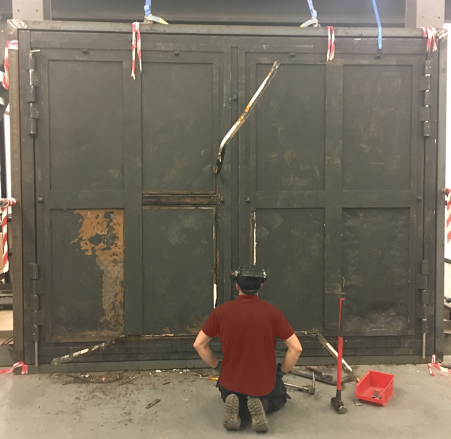
(Changing methods of attack mean that attack delay door design must, by necessity, continually evolve).
You also have to factor in changing standards. Standards are always evolving as they are updated/refined to meet changing threats (such as security, fire, flood or acoustics). So, in order to avoid regulatory obsolescence, we have to continually adapt and innovate, changing our products so that they are up to date.
And, sadly, there are tragedies which trigger changes in what is deemed acceptable for door performance. Tragedies such as Kings Cross and Piper Alpha changed the way clients specify doors. Specifiers have taken note of these events and are now re-thinking how doors that provide safe areas of refuge for people, should be specified. Because of this, we’re seeing demand for high performance fire doors that require not only a high integrity rating, but also a high insulation rating and high-performance smoke seals.
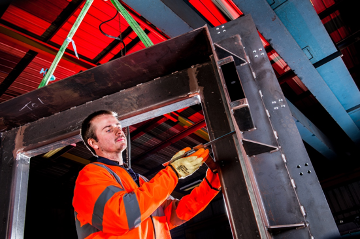
At Rhino we recognise that the needs of specifiers vary and as such we tend to offer a collaborative, flexible approach to provide a solution that works for their project. We see our job as making the life of the specifier as easy as possible and it’s something I am proud to say we are very good at.
And, as a full lifecycle provider of engineered doors, we can offer a level of flexibility and responsiveness that many manufacturers cannot. We’re most certainly not a run-of-the-mill commercial door producer. We take a bespoke, tailored approach, which means we can almost always find a solution to the most challenging projects.
Naturally, we are also proud of the high-quality, innovative nature of our products. We’ve been at the forefront of engineered door design since the mid-1990s, and as I mentioned earlier, we’re one of the UK’s leading providers of NPSA-rated doors and you’ll now find our doors installed at nuclear, defence, and critical infrastructure installations in the UK, Australia, Qatar and elsewhere. I think it’s also important to mention that our doors are designed and manufactured in the UK. With COVID-19 continuing to disrupt global trade, we can fulfil orders for projects, without having to rely on overseas manufacturing facilities which could face significant disruption. Plus, our partnering agreements across the world mean that we can produce doors in-country in a variety of locations, should this be appropriate and practical.
Engineered doors (as opposed to low cost commercial, production line produced doors) are by their very nature bespoke. You’ll often find that there are competing or conflicting requirements when specifying an engineered door, with various stakeholders requiring different things from the door. So, it’s really important that you choose a door supplier that takes a holistic approach, is able to process and incorporate multiple forms of feedback and take a ‘whole project’ view to ensure the solution is as good as it can be.
In a way, it’s not really about the door itself. Perhaps the most important consideration is the supplier. Selecting one that is knowledgeable, and collaborative will make the life of the specifier much, much easier.
I would also say that it’s most helpful for specifiers if they can find a supplier that works across the full lifecycle of a door. This means a supplier that factors in initial purchase price, impact on the civil engineering envelope, installation and subsequent maintenance throughout the life of the door.
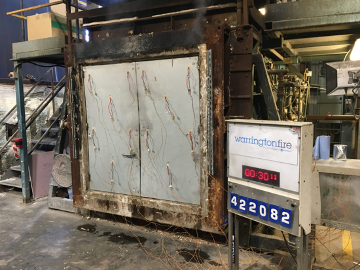
Yes, there are quite a number! There are two major developments that really stand out. We’re currently working on the development of a high-performance two-hour integrity and insulation rated fire door. It’s something which we’ve been working on for a few months now and is one of the results of our increased investment in R&D. The development work on this product is progressing really well, and notwithstanding unavoidable delays due to COVID-19, we expect that we will still be on track to launch this as a design platform later in 2020.
Our other development leverages our experience and expertise in the oil and gas sector. We’re currently working with a client to develop a combination door/explosion relief panel for use within the hydrogen fuel cell refuelling sector. This project is in its early stages but is particularly challenging due to the explosion characteristics of hydrogen, hence the need for an ultra-fast explosion relief mechanism. We’re really excited about the potential of this product as the hydrogen re-fuelling market is expected to grow rapidly over the next decade.
Look out for the next article in our Spotlight on Team Rhino series, which will feature our Chief Engineer Dr. Chris Norris.
Want to find out how Rhino Doors can help your project? Contact us today.
The Explore Export Wales event will showcase how the Welsh government can help Welsh companies with exports and trading overseas and the support they can offer businesses to help them succeed.
READ MOREStuart Lawrence, Group Managing Director and Jan McPherson, Group Commercial Director had the amazing opportunity to attend an exclusive a black-tie gala dinner inside St. Pauls Cathedral for the Make UK Manufacturing Awards 2023 on January 25, 2024.
READ MORE